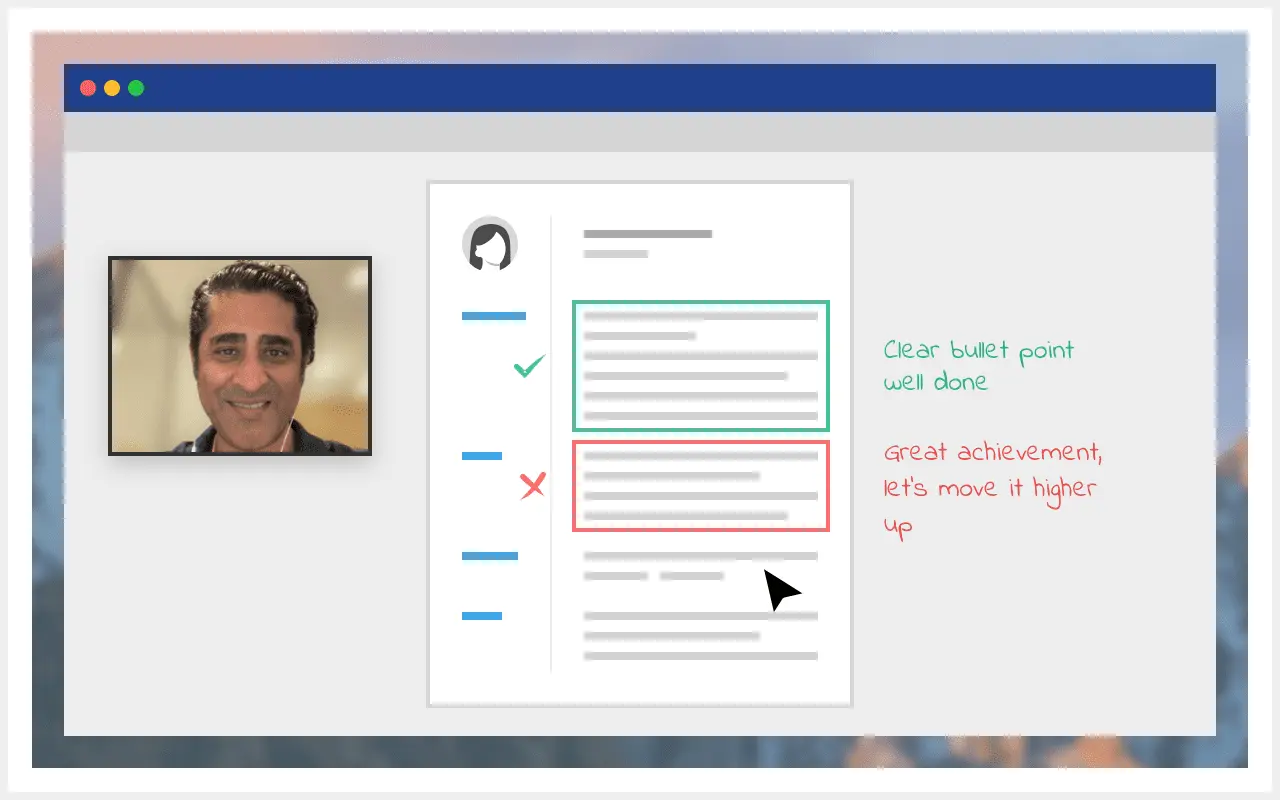Today we're going to explain the differences between the Big 4 and MBB firms, and how you can move from the Big 4 to MBB as a consultant.
We've helped candidates get job offers at both the Big 4 and MBB firms. Like Katrina who landed at Deloitte, and Andrew who landed at BCG.
And one of the first things you'll want to know about these companies, is that the Big 4 and MBB firms often do different types of work, but more on that later.
Here's an overview of what we'll cover:
- Size
- Services
- Salaries
- Prestige and exit opportunities
- Hours and work/life balance
- Moving from Big 4 to MBB
Let's get started!
Get a resume review with an ex-MBB consultant and land consulting interviews
1. Size
The two most straightforward measures of size for these firms are their total revenue and number of employees.
Using these metrics, it’s very easy to see that the Big 4 firms (i.e. Deloitte, PWC, EY, and KPMG) are substantially larger than the MBB (i.e. McKinsey, BCG, and Bain) firms.
Here’s how their total revenue compares:
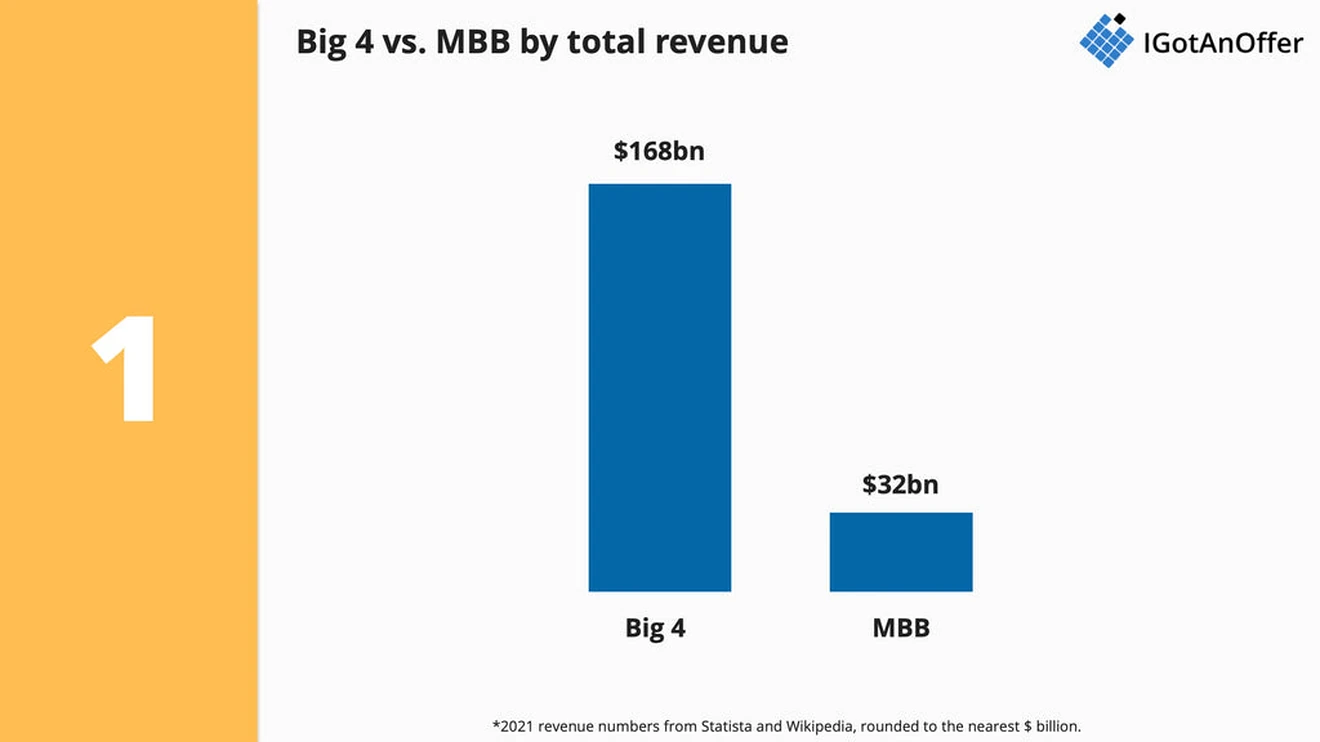
After seeing this chart, you might think to yourself that this is an unfair comparison because the Big 4 contains 4 companies, whereas MBB is made up of only 3.
We can adjust for that by determining the average revenue of Big 4 vs. MBB firms, but the Big 4 firms still come out significantly ahead.
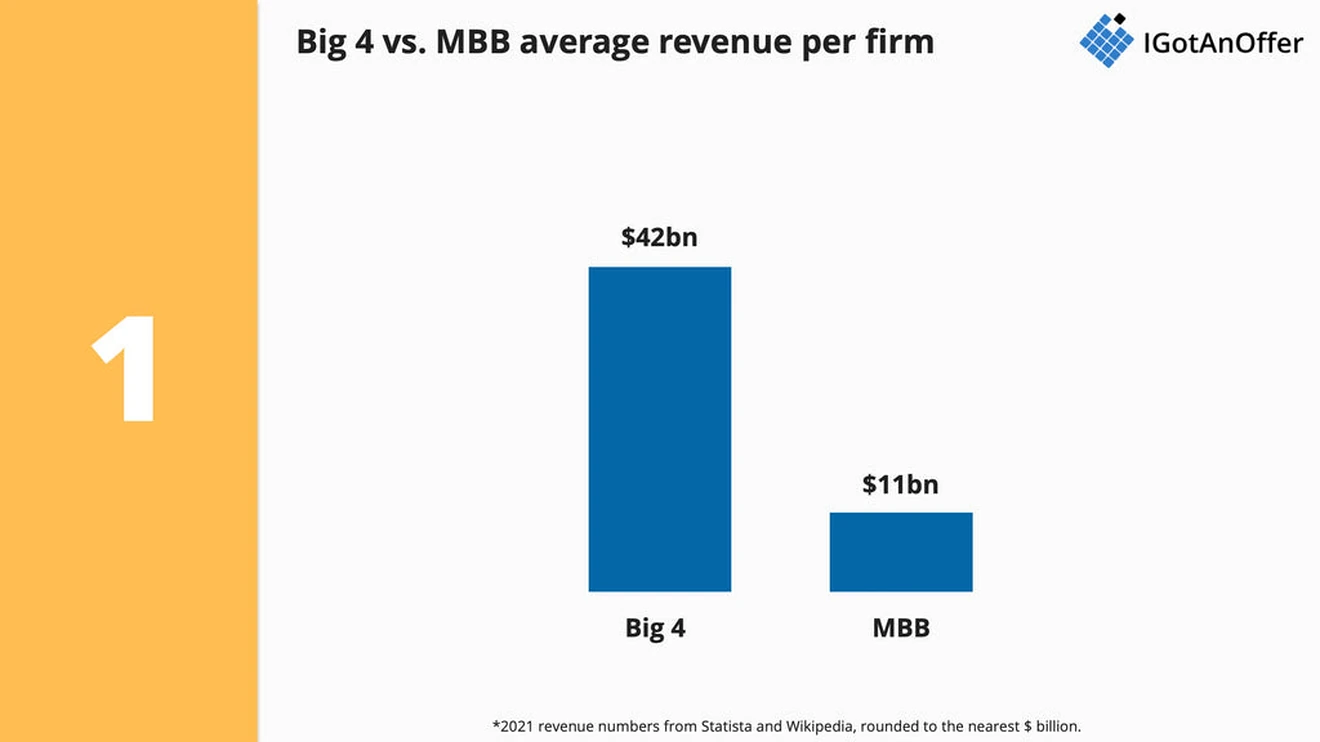
And if you look at the average number of employees at a Big 4 firm vs. an MBB firm, then the larger size of Big 4 firms is even more apparent.
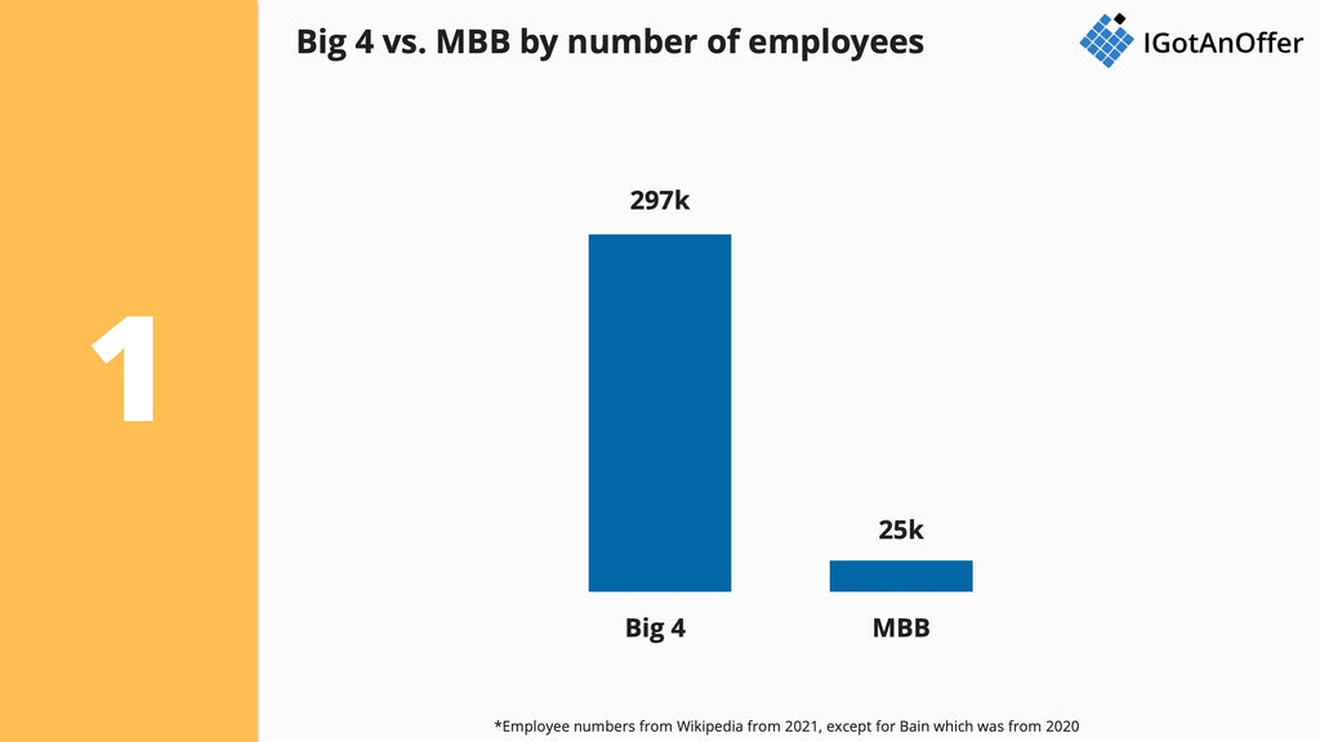
However, this isn’t a perfect comparison because Big 4 firms actually have three core businesses, whereas the MBB firms are only really involved in one of those three businesses.
Let’s dig into that more in the next section.
2. Services
2.1 Big 4 firms have three core businesses
The Big 4 firms provide tax and auditing services, in addition to consulting.
In fact, the Big 4 firms are probably best known as accounting firms, which further illustrates how important their audit and tax businesses are to these companies.
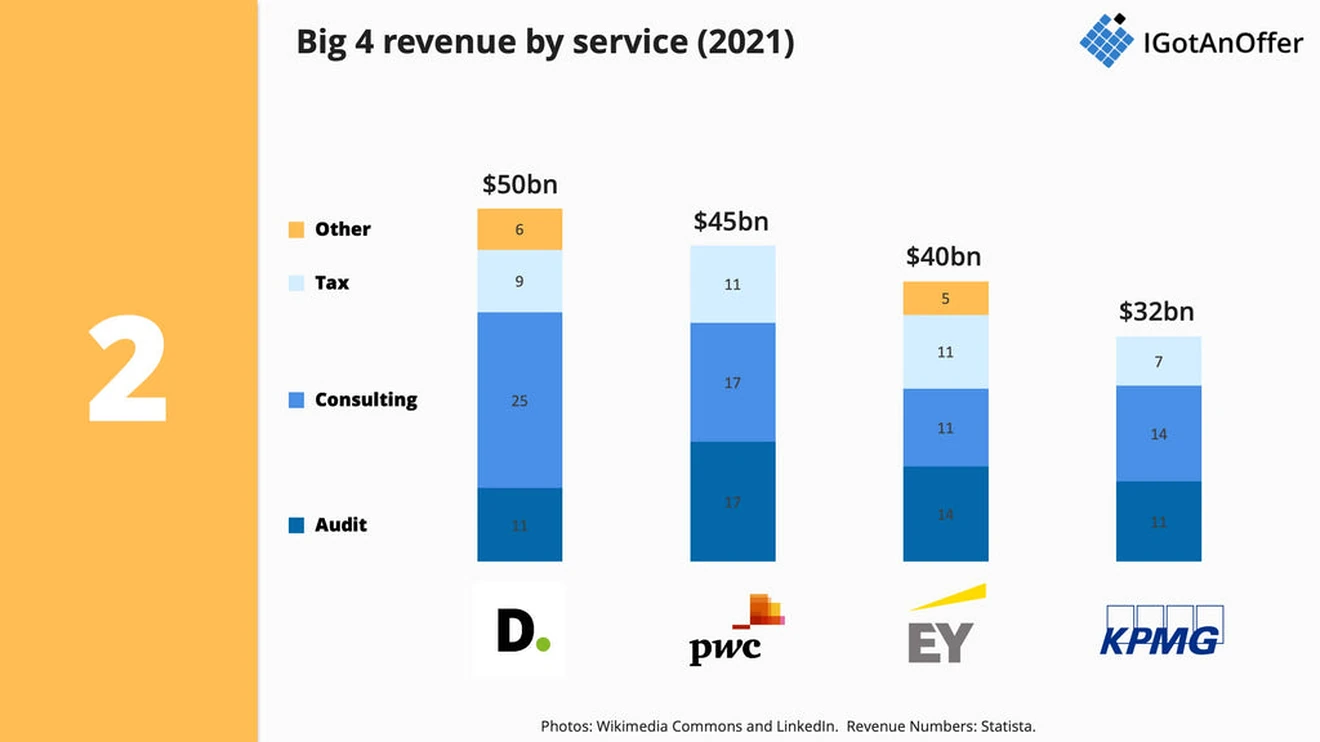
2.2 MBB firms only do consulting
On the other hand, MBB firms don’t do tax and audit services like the Big 4. MBB firms get essentially all of their revenue from consulting services.
So, if we level the playing field by removing the tax and audit revenue from the equation, then the average revenue generated by the Big 4 and MBB consulting practices are much closer.
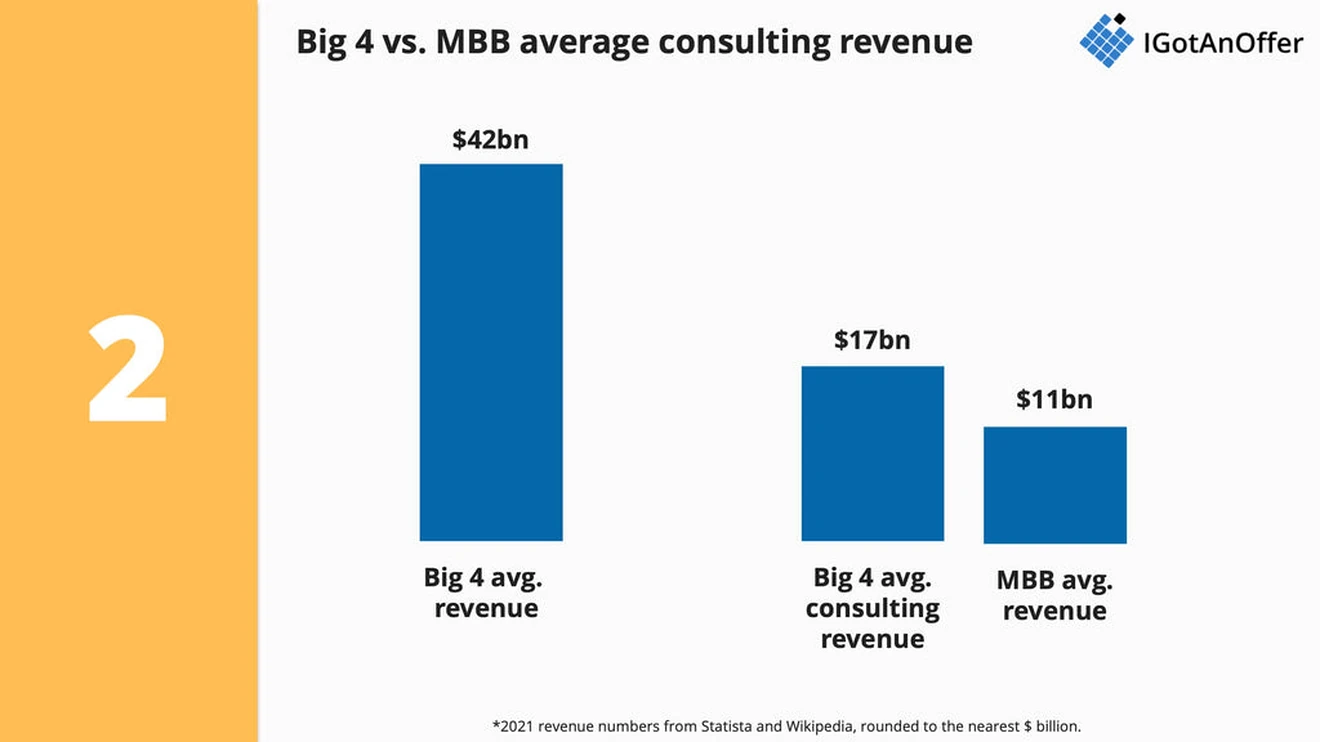
But it’s also important to understand that “consulting” is a very broad category of services, and both the Big 4 and the MBB firms do several types of consulting services. But all of these various services can be broken down into two main categories.
2.2 Big 4 / MBB firms do 2 types of consulting
Broadly speaking, leading consulting firms do 2 types of consulting:
- Strategy / management consulting
- Implementation consulting
It’s very important to understand this distinction, because MBB firms tend to dominate one, while Big 4 firms do more work in the other.
Type 1: Strategy consulting (MBB firms lead)
Strategy / management consulting is what most people think of when it comes to the consulting industry. And this was also the only type of work that consulting firms did when the earliest consultancies were first founded.
McKinsey, BCG and Bain are the clear market leaders in strategy consulting.
Typically, this type of consulting is done by small teams who would help the executives at a large (often Fortune 500) company make major decisions about the direction of the firm, new opportunities, etc.
For example, here are a few examples of the topics that a strategy consulting project might focus on:
- Should the client enter a new country with their products/services?
- The client’s profits are declining, what’s the root cause? And how can they fix it?
- Should the client make X investment in new technology?
- What can the client do with their sales process to drive more revenues?
If you want to see more examples of strategy consulting cases, check out these MBB example cases.
Type 2: implementation consulting (Big 4 firms lead)
The other type of consulting is implementation consulting. This is a more recent service that has gained traction over the last few decades, and the Big 4 firms have historically been market leaders for implementation services.
However, the MBB firms have been getting more involved in the implementation space, and given their reputations and talent pools, they’ve managed to win market share for implementation projects that would have previously gone to Big 4 firms.
An implementation project is often conducted by much larger teams, and the members of the consulting team are often specialists. These teams would work with middle managers and other client stakeholders in order to set up a new system, process, technology solution, etc.
Compared to strategy projects, implementation projects also usually take more time, since the implementation of a strategy typically takes longer than the initial formation of that strategy.
For example, here are a few examples of the topics that an implementation consulting project might focus on:
- Designing and building a new database system to improve the client’s analytics
- Implementing a new operations process to reduce costs for the client
- Fixing a client website that is frustrating or losing users
- Helping the client develop a proof of concept, for a new product or service
3. Salaries
If you’re considering the MBB or Big 4 as a future employer, then you’ll also want to know where they stand when it comes to salaries.
As we’ve covered above, the MBB and Big 4 firms all provide a WIDE variety of services. As a result, the different roles that they hire for vary significantly. For example, they hire tax accountants, software engineers, and data analysts in addition to various types of consultants. And all of these roles have different salaries.
Compensation is also different depending on the level of seniority. And each of these firms have different promotion ladders and often use different terms for roles that are essentially the same across firms.
To simplify all this, let’s focus on just one specific role that exists across all Big 4 and MBB firms, so that we can make an apples-to-apples comparison. Specifically, let’s look at:
- Role: Management consulting (i.e. not implementation consulting, tax, audit, etc.)
- Seniority: Entry-level (note: depending on the firm this may be called Business Analyst, Associate, Consultant, etc.)
Here’s how this role is compensated at each of the MBB and Big 4 firms:
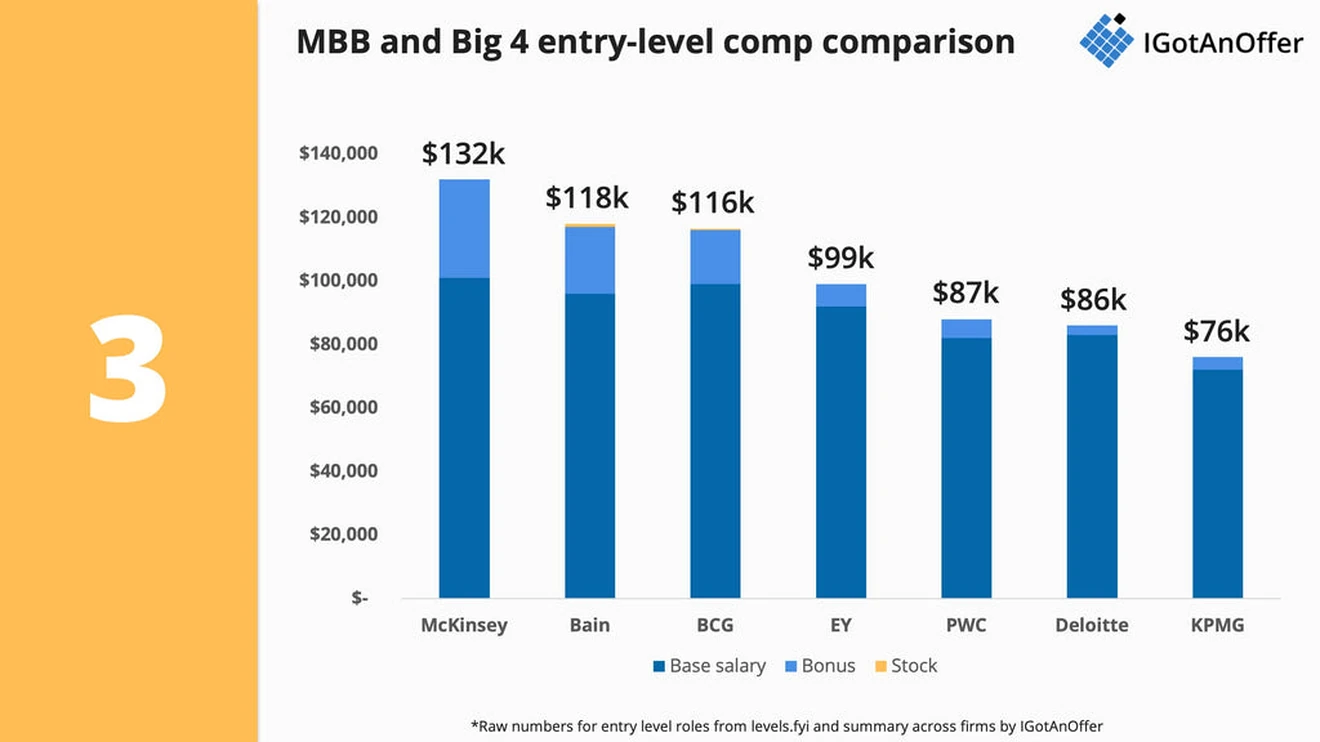
According to data from Levels.fyi, the MBB all have better compensation than the Big 4 firms.
And if you take the average compensation for the Big 4 and MBB firms, this is how they compare:
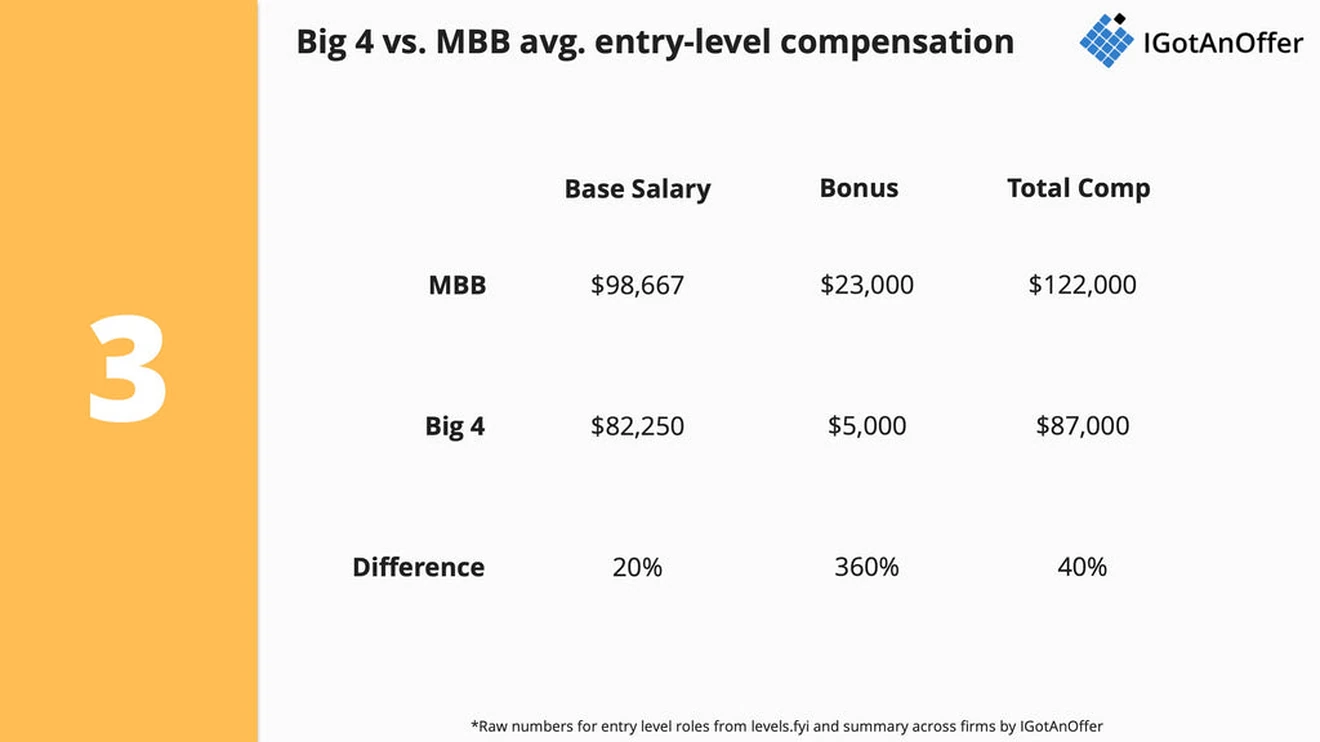
As we mentioned earlier, the specific details of an individual’s compensation will vary by role and seniority, and it’s also worth mentioning that comp typically varies by your location.
But, generally speaking, if you work at an MBB firm you’re probably going to make more money than if you work at a Big 4 firm.
4. Prestige and exit opportunities
The MBB and Big 4 firms are all quite prestigious.
But, since we’re comparing the two groups, the MBB firms are considered to be more prestigious for strategy and management consulting.
As we’ve covered previously, the Big 4 tend to have an edge in implementation consulting. For example, if you were interested in specialising in IT consulting, then Deloitte (as well as a few other consultancies) is rated higher than all of the MBB firms.
With that said, if you have aspirations of landing a C-suite role or other fiercely competitive roles, then you’ll almost always be better off having McKinsey, BCG, or Bain on your resume.
And if you ask any consultant which firms are the most prestigious, the vast majority will rank MBB firms over Big 4 firms.
But at the end of the day, there is a history of alumni success stories from Big 4 firms, MBB firms, as well as from other top consultancies.
To further illustrate the exit opportunities, here are some notable alumni from the Big 4 and MBB:
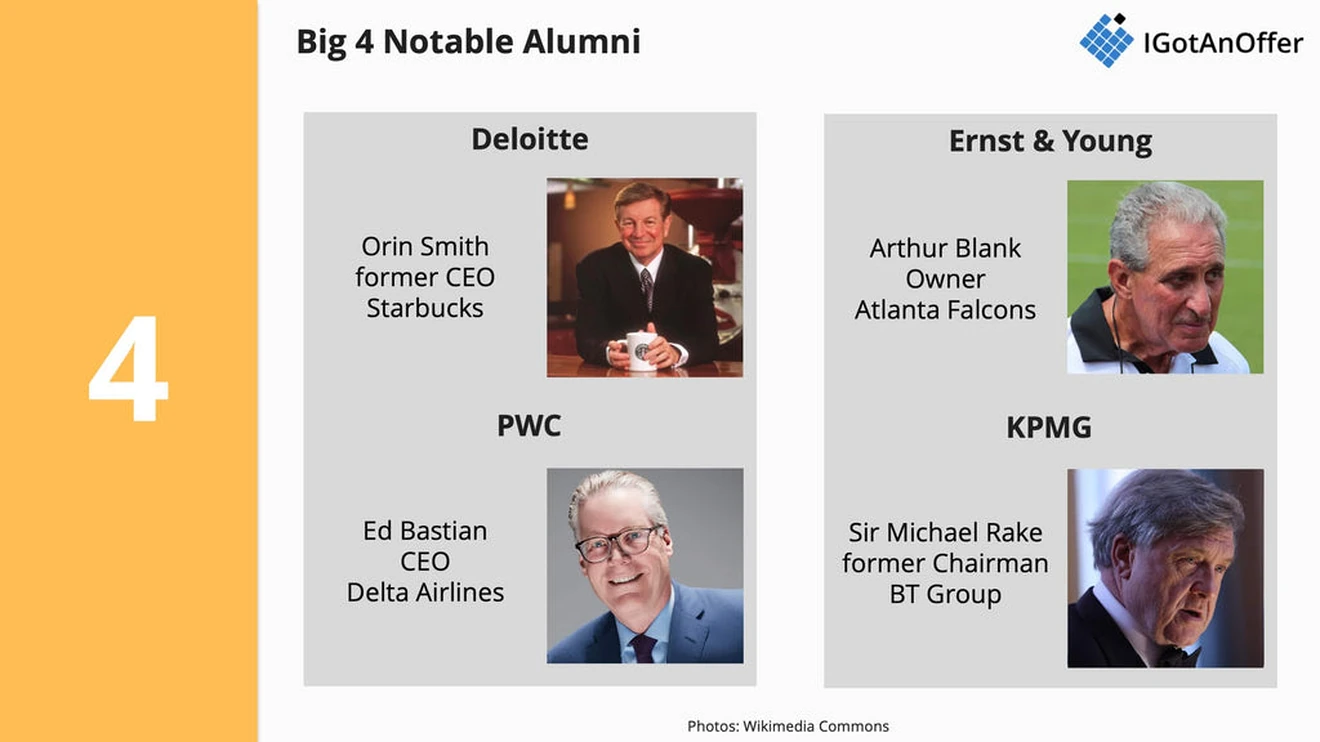
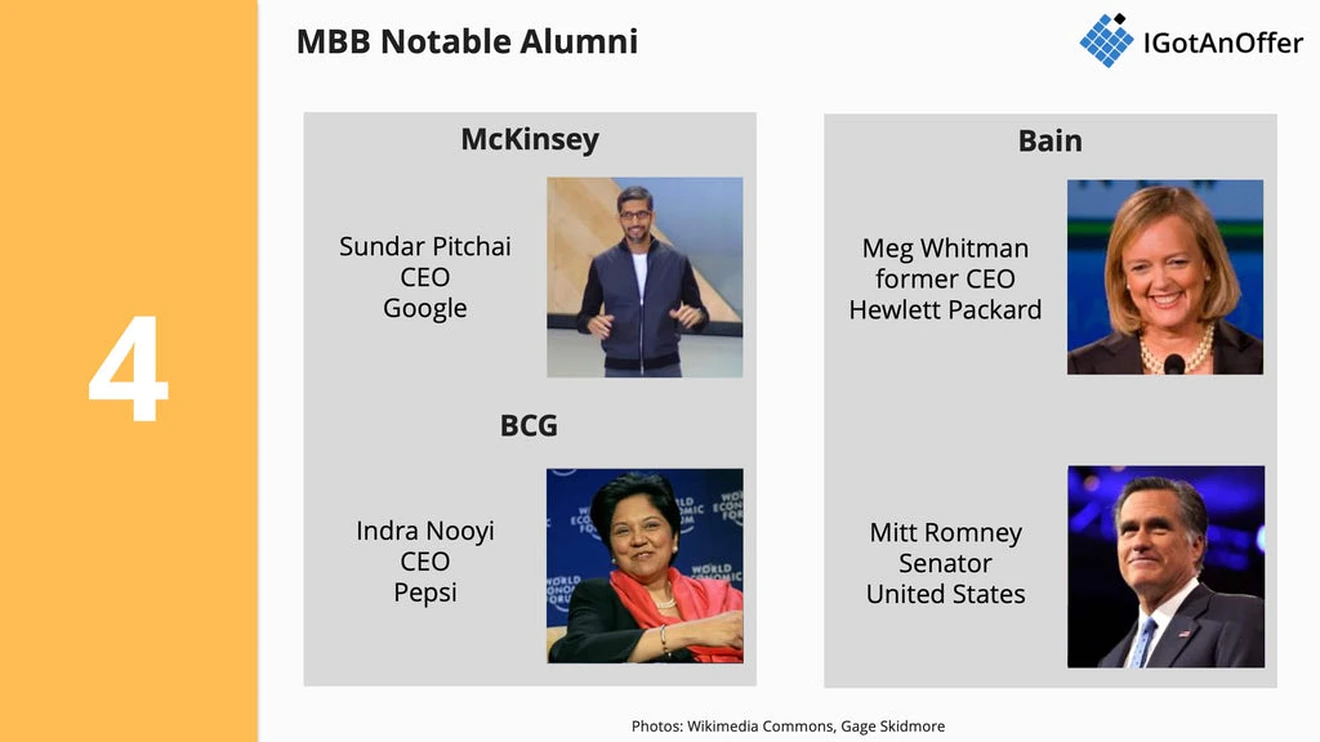
5. Hours and work/life balance
If you’re considering a role at an MBB or Big 4 firm, then it’s also worth considering the work hours and overall work/life balance of these firms.
A recent report showed that MBB firms tend to work longer hours than the Big 4 firms.
However, if you look at the strategy “arms” of the Big 4, which includes Parthenon (an EY subsidiary) and Strategy& (a PWC subsidiary), the hours were actually pretty close to their MBB counterparts, with the exception of McKinsey, which had the longest hours out of any Big 4 / MBB firm.
And if we look at work/life balance more broadly (i.e. not just the hours worked), then the report also showed that Big 4 firms tend to score better on work/life balance compared to MBB firms. However, KPMG broke this general rule, because it received the worst work/life balance score of any firm.
Within each group, Bain scored the best among the MBB, and PWC scored the best among the Big 4 for the best work/life balance.
With that said, consulting is unique in that your actual work/life balance will vary dramatically depending on your specific project, the client, and your manager.
For example, there might be a Deloitte project with a demanding client and tight deadlines, where you work 70+ hours a week. And there might be a BCG project where the work load is lighter and you only work 60 hours a week. It varies.
6. Moving from Big 4 to MBB
6.1 Is it possible?
Given the higher prestige and compensation at MBB firms, you may wonder whether you can move from the Big 4 to the MBB.
Generally speaking, it’s possible to move from a Big 4 to an MBB firm. However, MBB firms tend to be more selective than Big 4 firms, and it’s difficult to get an offer despite having Big 4 experience. But, there are ways you can increase your chances, such as specialising in an area where an MBB firm is scaling.
6.2 Is it worth it?
But before you decide to apply for an MBB position, you should pause for a moment to consider whether or not it’s worth it for you.
Each individual will have a different set of career goals and personal values, and depending on yours, a Big 4 role might actually be a better fit for you than a new MBB position. So, put some thought into it, and consider if that MBB role will really bring you closer to your long-term goals.
Before applying, you should also consider the prep time needed to succeed in the case interviews that MBB firms are famous for. Unfortunately, your Big 4 experience won’t allow you to skip the rigorous interview process.
And if you have the opportunity to talk with current MBB consultants about their experience, that can also be a great way to weigh the pros and cons. It might also provide an opportunity for you to get an internal referral, which can help your application get noticed.
Once you’ve made up your mind, then there are some more tactical steps you can take to get your foot in the door of an MBB firm.
6.3 How to get into MBB from Big 4
You may already be familiar with the basic MBB interview process. But if not, you can learn about it for each firm using the free guides below:
There are also a few things you can do outside of the normal interview prep in order to increase your chances of moving from the Big 4 to an MBB.
Let’s look at a few tactics more closely:
Strategy 1: Go Get an MBA
If you currently work at a Big 4 and haven’t done an MBA yet, getting an MBA at an MBB target school can go a long way in helping your application to get noticed.
MBB’s often recruit from a set of their favourite “target” schools, and if you are enrolled at one of them, that will significantly increase your chances of getting an interview and ultimately an offer. For example, Stanford is a target school and you can learn more about what it takes to gain admission in our Stanford GMAT guide.
Another reason this strategy works is that it can be hard to get your application noticed as an experienced hire, especially if you’re applying outside of the firm’s normal recruiting cycles.
As an MBA applicant, you would fit more naturally into the recruitment processes typically used by MBB firms, which would remove some obstacles for you, and would probably also give you more opportunities to meet and speak directly with representatives from MBB firms.
Doing an MBA is a big commitment, but if you really want to land an MBB role, you may need to take a long-term approach.
Strategy 2: Specialise where MBB is weaker
The MBB firms are growing their offering of consulting services. They don’t just do strategy consulting anymore, they also do a variety of other services, including some types of consulting where they are playing “catch up” with Big 4 firms.
For example, according to Vault’s prestige rankings, Deloitte and EY both beat MBB for Financial Consulting.
As another example, Accenture and IBM are both ranked above MBB for IT strategy consulting. Accenture and IBM aren’t technically Big 4 firms, but this just illustrates how you can increase your chances of getting into MBB by specialising in a type of consulting where the MBB firms are weaker or are trying to grow their presence.
At the end of the day, the MBB firms need people who are experts in the industries and skillsets that their clients need. If you can align your own skills with an area where an MBB firm is weaker, then you’ll give yourself an edge over other candidates.
Strategy 3: Connect with MBB people
When you submit your application to an MBB firm, that does NOT guarantee that it will be seen by the people within the firm who would most value your experience and qualifications.
The MBB firms get flooded with applications every year, and only a small percentage of applicants even get an interview.
So, to get noticed it helps to make connections within the firm.
This is valuable for a few reasons.
First, if you’re able to connect with someone who is involved in the industry where you specialise, then they may even be able to influence your hiring decision and help you to join their team directly.
In addition, MBB firms have internal referral processes that allow current employees to recommend new candidates for consideration. Referrals can help your application get noticed, even if the person who refers you isn’t in the same industry as you.
Strategy 4: Cast a wide net
Roughly 1% of all applicants to McKinsey, BCG, and Bain ultimately get an offer. To put that number into perspective, that's roughly 3X lower than Harvard's lowest annual acceptance rate in the last 20 years, which was 3.19%.
So, even if you are an exceptional consultant or student, your chances of landing an offer at an MBB firm are really small.
Don't let that discourage you though! You should still go for it, and you can use the other strategies we've mentioned above to help increase your odds.
With that said, applying to top consultancies is a little bit of a numbers game.
So, it's probably a good idea to cast a wide net, and apply for a few consulting firms outside of the MBB. This will increase your chances of landing an offer, and upon doing the research, you may even find other firms to be a better fit for your goals and lifestyle.
Strategy 5: Optimise your application to get noticed
The majority of MBB applicants get eliminated before even getting an interview, during the resume and cover letter screening.
So, it's critically important for your application to stand out. And you'll need to understand which experiences to emphasize, what to cut from your resume, and how to write a cover letter that MBB recruiters will find compelling.
To help with this, you can use our free consulting resume guide and consulting cover letter guide.
But if you really want to maximise your chances of getting an interview invitation, then it's extremely useful to get feedback on your documents from an experienced ex-interviewer from your target firm.
And here's the good news: we have a whole team of ex-MBB recruiters and interviewers who are ready to give you feedback on your resume and cover letter. You can browse available coaches and book a review session here.














